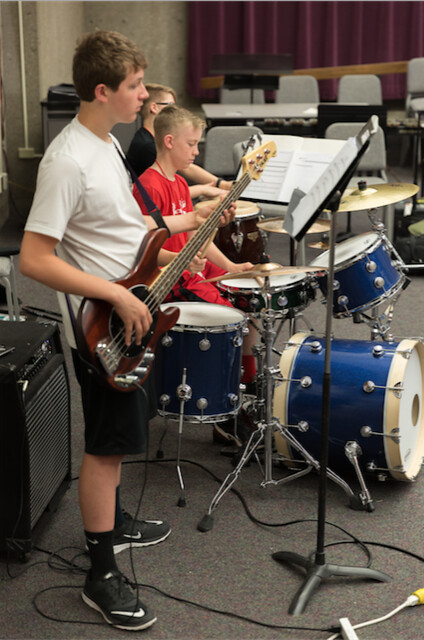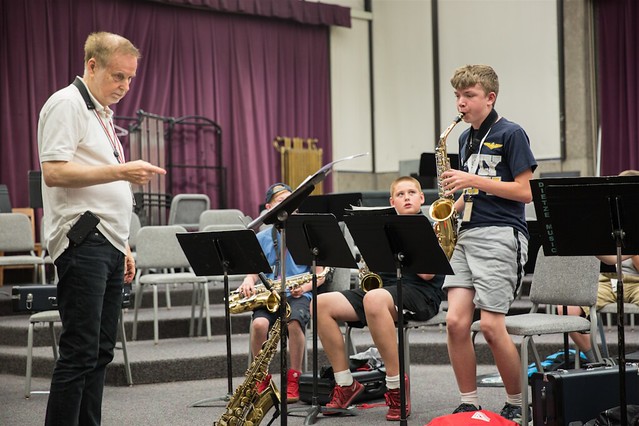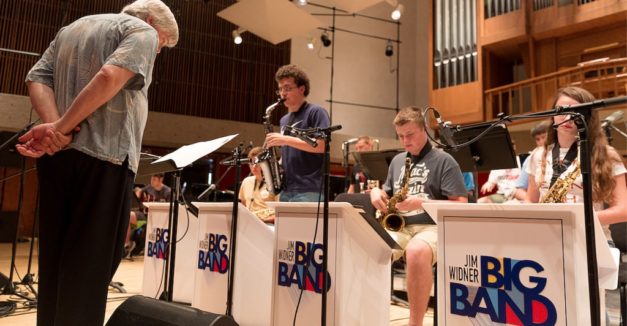The sound of a trumpet player practicing scales reverberates through the halls of the Milo Bail Student Center. In the cafeteria, during a break from jazz lessons, a bunch of young kids chatter away with each other, their instruments cased at their feet.
Around one lunch table sits a group of high schoolers. They are talking about their jazz theory and improvisation classes, eager to share the advanced harmonic structures and chord progressions they have been practicing all week.
“Two-five-ones!” Ava Browman exclaims excitedly to her friends when asked what her day at camp was like. “Two-five-ones! Two-five-ones! And more two-five-ones! That’s what we are learning in music theory class at least.”
Bowman, a rising senior alto saxophone player from Westside High School, was one of nearly 130 young jazz musicians from across Nebraska and the midwest that descended upon the University of Nebraska-Omaha’s Dodge Street campus last week for the eighth annual Jim Widner Big Band Jazz Camp.
The camp, which has come to college campuses across the country for 29 years, brings one of the world’s finest — and last — full-sized jazz orchestras to UNO. The students spend eight hours a day in instrumental workshops, ear training, music theory and jazz improvisation classes, rehearsals and concerts all centered around learning the art of jazz.

Over the course of the week, the students work in a variety of different settings in order to maximize their exposure to myriad concepts. They audition for camp faculty at the beginning of the week and are assigned big bands according to their ability and prior knowledge. They also must take a music theory test; they are placed in ear training and improvisation classes accordingly.
Throughout the week, the students rehearse multiple hours a day in their big bands, preparing a short set list of charts to perform at the Friday night concert. That night, each participant gets the opportunity to put their newly minted jazz skills into action for their friends and family. The Jim Widner Big Band also plays a mixed set of big band standards and new compositions.
Their band directors are all world-class jazz professionals from around the country and the globe. Kim Richmond, who directed the youngest band this year, is a recording artist in Los Angeles who directs two respected jazz ensembles. Many faculty members, including Widner and lead trumpet player Mike Vax, are alumni of the Stan Kenton Jazz Orchestra — one of the most well known and prolific big bands on the 20th century.

The students enjoy unbridled access to some of the country’s finest musicians, and the camp is designed to push what them towards a deeper understanding of jazz.
“This camp puts you outside of your comfort zone,” says jazz camp participant and Millard West student Chris Brady.
“We learn how to learn new things,” adds bassist and Brownell-Talbot rising senior David Bredthauer.
For the staff, the camp is less about mechanics and more about appreciation.
“The camp is about spreading the word, the message about jazz,” says Dave Scott, camp faculty member and professional jazz trumpeter in Widner’s Band. “I want my students here to leave with a deeper appreciation and depth of listening when it comes to jazz. It’s an esoteric and under-appreciated art.”
Listening is the most important lesson that the camp imparts on the students, Richmond adds. “The students need to have exposure to all styles of jazz.”

Kim Richmond teaches students at the Jim Widner Big Band Camp
To both the students and staff, the camp also represents an opportunity for young Nebraskan musicians from across the state to learn jazz concepts and ideas that they might not have the chance to learn in their schools.
Some campers note their school programs are limited in terms of what they offer – like improvisation and jazz theory courses.
“I don’t feel like I can specialize like this at school,” Bowman says.
Perhaps most importantly, the busy camp days are punctuated by full-length concert sets from the Jim Widner big band.
“We feel this is the most impactful aspect of the camp,” says Dr. Pete Madsen, camp director and coordinator of Jazz Studies at UNO. “Our students get to hear the lessons they are learning applied to the art every night.”
At the end of the week, the students each get a chance to perform for each other in their own big bands. Some take solos, putting their newly learned improvisation skills to the test. For some, it is their first time ever swinging or playing a samba. For others, this is a stepping stone to the professional jazz world.
For all participants, however, the UNO Jim Widner Big Band Camp represents an opportunity not found anywhere else in the state; an opportunity to learn from some of the industry’s finest, improve their skills, be introduced to novel and advanced jazz ideas — like two-five-ones — and most importantly, make music with one another.




